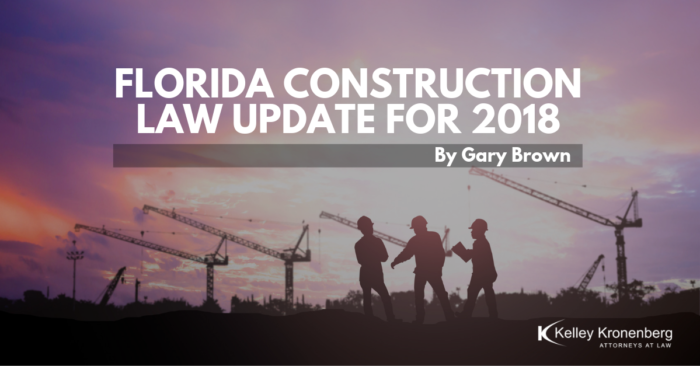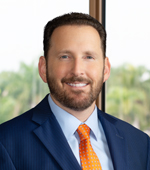February 22, 2019
ShareFlorida Construction Law Update for 2018
By: Gary L. Brown

Throughout 2018, the construction industry in Florida saw significant changes to the law. Some were statutory changes, while others were from the courts. Here are a few of the more significant changes that are affecting the industry:
- Gov. Rick Scott approved changes to Florida Statute § 95.11(3)(c), Florida’s statute of repose for construction defect claims, that gives the ultimate deadline of ten (10) years to assert claims for latent defects. The amended statute now allows an additional year to file a counterclaim, cross claim, or third party claim that arises out of the conduct, transaction, or occurrence set out in the original pleading of a lawsuit that is based on the design, planning or construction of improvements to real property. Prior to the amendment, the statute would have barred such claims raised after the ten-year repose period.
- In Blok Bldrs., LLC v. Katryniok, 245 So. 3d 779, 783 (Fla. 4th DCA 2018), the Fourth District Court of Appeal found that Florida Statute § 725.06(1) is inapplicable to a contract involving the laying and maintenance of utility lines. Florida Statute § 725.06 dictates that an indemnity obligation in a contract for or in connection with “any construction of a building, structure, appurtenance, or appliance, including moving and excavating associated therewith” that seeks to protect a party from its own fault is void as against public policy unless the contract complies with certain statutory requirements including a “monetary limitation” on any indemnification provision within the contract. In this case, a subcontractor was hired to perform excavation to access preexisting underground telecommunication lines. This work ultimately resulted in a personal injury action where the injured person sued the contractor, subcontractor, and utility company. The contractor and utility owner both claimed that the subcontractor was responsible for contractually indemnifying them for all losses, including attorney’s fees. The subcontractor argued that the indemnification provision should be deemed unenforceable because it did not contain a monetary limitation on the extent of the indemnification. The court, however, found that the statute was inapplicable since the contract did not involve “construction of a building, structure, appurtenance, or appliance.”
- In a case of first impression in Florida, Gindel, et al. v. Centex Homes, et al, 2018 WL 4362058 (Fla. 4th DCA Sept. 12, 2018), the Fourth District Court of Appeal held that the service of a pre-suit construction defect notice, required by Chapter 558, Florida Statutes, constitutes an “action” for purposes of the statute of repose in the context of the improvement of real property (Florida Statute § 95.11(3)(c)). Therefore, even though the lawsuit was filed after the ten-year repose period had expired, the court found that the lawsuit was not barred by the statute since the pre-suit notice was timely served before expiration of the repose period.
- In DeLisle v. Crane Co., 2018 WL 5075302 (Fla. Oct. 15, 2018), the Florida Supreme Court held that the Florida Legislature’s 2013 amendments to the Florida Evidence Code, which adopted the federal Daubert standard for admission of expert testimony, was unconstitutional. In 2013, the Florida Legislature voted to amend Florida Statute § 90.702 in order to replace the Frye test (which had been the standard of admissibility of expert testimony in court proceedings in Florida for the past 50 years) with the Daubert standard. The Florida Constitution provides the Florida Supreme Court with exclusive authority to “adopt rules for the practice and procedure in all courts,” which the Florida Legislature can only repeal by “general law enacted by two-thirds vote of the membership of each house of the legislature.” The legislative vote to amend Florida Statute § 90.702, did not meet this requirement in the Florida House, although it did in the Florida Senate, and therefore, the Court declared the amendment unconstitutional. With the Court’s ruling, Florida returns to a Frye jurisdiction. However, it remains to be seen how the lower courts in Florida will address whether and to what extent parties will be granted relief from final judgments entered under the Daubert standard following the statutory amendments, which the Court has now ruled were unconstitutional. The Court’s ruling also left the door open for the legislature to try again to implement the Daubert standard with the requisite two-thirds majority vote. So, it remains to be seen whether Florida will once again be governed by the Daubert standard.
- The Federal Arbitration Act allows parties to agree by contract that an arbitrator can decide threshold questions of arbitrability, rather than a court. In Henry Schein, Inc., et al., v. Archer & White Sales, Inc., 586 U.S. _ (2019), No. 17–1272, slip. op. (U.S. Jan. 8, 2019), the United States Supreme Court rejected the “wholly groundless” exception to the Federal Arbitration Act which enables courts to block frivolous attempts to transfer disputes from the court system to arbitration. The Court concluded that the “wholly groundless” exception was inconsistent with the Federal Arbitration Act and that courts cannot override the terms of parties’ agreement to arbitrate.
- In Keystone Airpark Auth. v. Pipeline Contr., No. 2019 WL 323775 (Fla. 1st DCA Nov. 27, 2018), the First District Court of Appeal concluded that the costs of correcting deficient construction work were “consequential” damages as opposed to “general” or “direct” damages, and were therefore, barred by the parties’ contract. In this case, the contract between an owner and a supervising engineering firm included a waiver of consequential damages. After construction was complete, the owner discovered that the contractor’s work was deficient including the use of substandard materials, and sued the engineering firm for not properly overseeing the work and ensuring that proper materials were used. In concluding that the damages were consequential, the court ruled that the need for repairs did not arise within the scope of the transaction between the engineering firm and the owner. Rather, the need for repairs stemmed from the loss incurred by the owner in its dealings with the contractor, a third party. The fact that the damages (i.e., costs of repairs) were “reasonably foreseeable” was not what made them consequential in nature as opposed to general or direct. Instead, the court concluded that the damages were consequential because it was still possible that the contractor could have properly performed its work and that no repairs would have been necessary, even if the engineer failed to properly supervise the work. Thus, the court concluded that the damages did not naturally flow from the engineer’s conduct, but instead from the conduct of the contractor.[Note: This case has an excellent discussion on the distinction between the different types of damages.]
These and other topics are discussed in more detail in Florida Construction Defect Litigation, published by the Daily Business Review, an ALM Media company. They can also be found online by clicking the following link: https://www.lawcatalog.com/productdetail/18108/florida-construction-defect-litigation
 Gary Brown is a Partner and the Head of the firm’s Construction Practice Group at Kelley Kronenberg. Gary focuses his practice on construction defect litigation and complex commercial litigation.
Gary Brown is a Partner and the Head of the firm’s Construction Practice Group at Kelley Kronenberg. Gary focuses his practice on construction defect litigation and complex commercial litigation.
Contact Gary Brown at:
Phone: 844-632-4357
Email: gbrown@kklaw.com
DISCLAIMER: This article is provided as a courtesy and is intended for the general information of the matters discussed above and should not be relied upon as legal advice. Neither Kelley Kronenberg, nor its individual attorneys or staff, are responsible for errors, omissions and/or typographical errors – always seek competent legal counsel.


